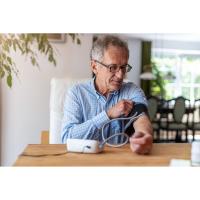As we age, monitoring blood pressure becomes increasingly vital for heart health. Seniors are particularly prone to isolated systolic hypertension. Regular monitoring helps detect and manage such risks. It's essential not only to spot high blood pressure but also to track its trends over time. Seniors and healthcare providers can then make informed decisions about lifestyle changes and treatments.
Blood Pressure and Heart Health
High blood pressure, or hypertension, is a silent threat to seniors' heart health, increasing the risk of heart diseases, strokes, and kidney issues. The strain from high blood pressure can harm arteries over time, leading to severe complications.
Studies, like SPRINT, highlight the importance of managing blood pressure, showing that seniors who maintain lower systolic blood pressure reduce their risk of heart disease and mortality.
Recommended Monitoring Practices
Seniors can effectively monitor blood pressure at home and in clinical settings by:
* Regular Checks: Get blood pressure checked during doctor visits and at home to identify any significant changes.
* Using Home Monitors: Choose validated monitors with the right cuff size for accurate readings.
* Understanding Readings: Know the normal range and what constitutes high blood pressure.
* Keeping Records: Maintain a log of readings for healthcare providers.
* Considering Lifestyle: Factors like stress, diet, and exercise affect blood pressure.
Lifestyle Changes for Seniors
Managing blood pressure involves lifestyle adjustments like...
* Dietary Changes: Follow heart-healthy diets and limit sodium and alcohol intake.
* Exercise: Aim for 150 minutes of moderate activity per week after consulting a healthcare provider.
* Weight Management: Maintain a healthy weight.
* Quit Smoking: Smoking cessation is crucial.
* Stress Management: Practice stress-relief techniques.
* Adequate Sleep: Ensure good sleep quality.
* Regular Check-Ups: Visit healthcare providers regularly.
The Role of Caregivers
Caregivers can support seniors by:
* Encouraging Monitoring: Remind and assist with blood pressure checks.
* Promoting Healthy Habits: Support healthy meals, exercise, and a smoke-free environment.
* Medication Management: Ensure adherence to medication schedules.
* Reducing Stress: Engage in stress-relieving activities.
* Education: Learn about blood pressure management to provide better support.
* Emotional Support: Offer companionship and emotional support.
The Orlando Senior Help Desk, a free resource provided by Jewish Pavilion Senior Services, can assist families seeking help to keep a senior in their lives healthy and happy. You can contact the Help Desk by calling 407-678-9363 or by visiting OrlandoSeniorHelpDesk.org.
Jewish Pavilion Senior Services
-
Nancy Ludin CFO
- December 18, 2024
- (407) 678-9363
- Send Email



